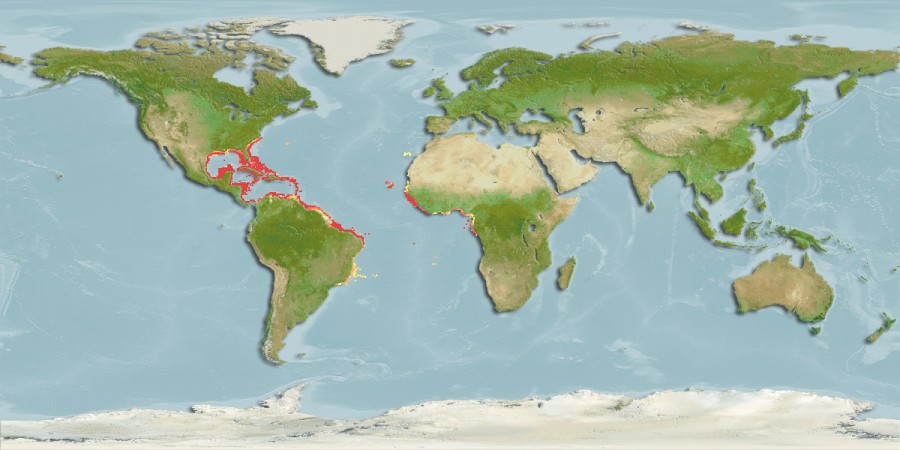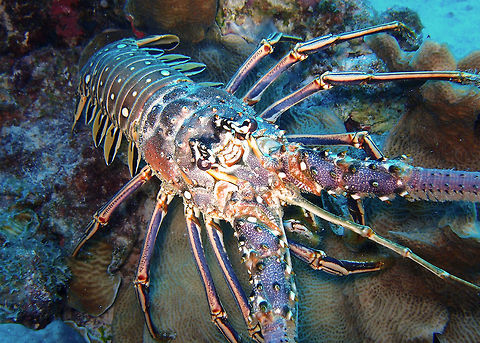Caribbean Lobster (Panulirus argus) is a large seashell that is different bright colors, long mustache and lack of massive claws. This view has great economic importance thanks to the tender meat, which is highly appreciated in world gastronomy.
Unlike lobsters, lobsters have a more elegant structure, more mobile limbs and a characteristic method of defense – fast jerks back with the help of the tail.

Classification
🔬 Scientific classification:
✔ The Kingdom: Animals (Animalia)
✔ Type: Arthropods (Arthropoda)
✔ Class: Crustaceans (Malacostraca)
✔ Row: Decimals (Decapoda)
✔ Family: Palinuridae (Lobsters)
✔ Gender: Panulirus
✔ View: Panulirus argus
📌 Interesting!
The Caribbean lobster has close relatives – red crayfish (Panulirus interruptus) and greenish crawfish (Panulirus guttatus)which are found in other tropical waters.
Appearance and dimensions
📏 Main Features:
• Body length: to 60 cm
• Weight: 1.5-4 kg, rarely more than
• Life span: up to 20 years old
🎨 Color scheme:
• Dark brown or reddish brown body
• Light spots and dark stripes on the shell
• Bright yellow or white dots on your feet
🔍 Body type:
• Strong, spiked Carapace
• Long flexible moustache - main sensory organ
• Lack of pincers, unlike lobsters
• A strong tail that helps you quickly escape from predators
📌 Interesting!
Caribbean crawfish can change the color shadeby adapting to the environment.

Living environment
🌍 Where does the Caribbean lobster live?
• Caribbean Sea
• Gulf of Mexico
• Atlantic Ocean (from USA to Brazil)
🏝 Living conditions:
• Depth: 1-90 m
• Wednesday:
* Coral reefs
* Sandy soils
* Mangrove forests
📌 Interesting!
Lobsters they are actively migratingforming long columns to avoid cold currents and predators.
Lifestyle and behavior
🦞 How does the Caribbean lobster live?
• Nocturnal predator "he hides among the corals during the day
• Single, but gathers in large groups during migrations
• It is protected by jerks back with the help of the tail
• Has an excellent sense of smellwhat helps you find food
📌 Interesting!
Crawfish can communicate with relatives with the help a special grinding sound, which it gives out by the friction of the antennas.
Food
🍖 What does a lobster eat?
• Shellfish (oysters, mussels)
• Crustaceans (crabs, shrimps)
• Sea urchins and stars
• Seaweed
🔍 Hunting methods:
• It tears the shell of clams with its strong jaws
• It searches for food through the sense of smell and touch
📌 Interesting!
Crawfish can cannibalize young animalsif there isn't enough food.

Reproduction
👶 How does crawfish reproduce?
• Females lay up to 2 million eggs
• Incubation lasts 3-4 weeks
• Larvae swim in the water column for up to 7 months
• Young individuals settle to the bottom after several molts
📌 Interesting!
Just 0.1% of larvae it survives to adulthood because of predators.
Human interaction
⚠ Is it dangerous for humans?
• Not aggressivebut it can hurt to pinch
• Highly appreciated in gastronomy
🍽 Lobster in cooking:
* One of the most expensive seafood products
* Used for grilling, soups, and pasta dishes
* The meat is more tender than that of a lobster
🎣 Fishing industry:
* Catch in traps and nets
* Controlled to prevent population destruction
📌 Interesting!
The largest lobster caught weighed 4.5 kg!

Interesting facts
📌 TOP 5 facts about Caribbean lobster:
1️⃣ Can change the color scheme for disguise
2️⃣ Defends itself by making sharp jerks with the tail back
3️⃣ Highlights a special "rasping" sound for communication
4️⃣ Lives up to 20 years, but most die from trapping
5️⃣ Its migrations can reach tens of kilometers
Conclusion
Caribbean Lobster (Panulirus argus) – a unique marine life, which combines refinement, strength and high culinary value.
Despite his resistance to natural conditions, overfishing threatens the population, so catch control and habitat protection are key factors for its conservation.
He long mustache, fast movement and nocturnal lifestyle make it one of the most interesting representatives of the deep sea!
